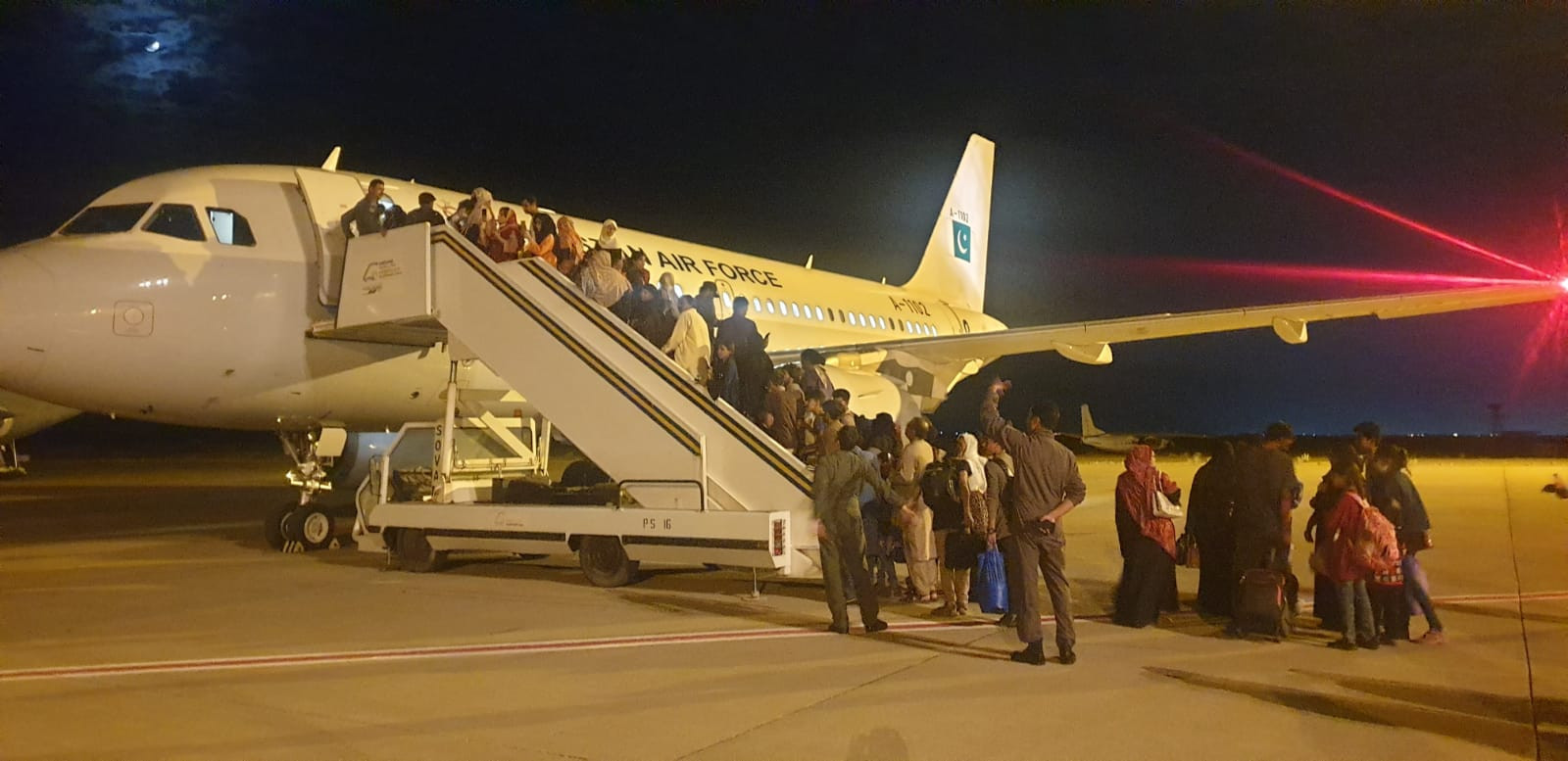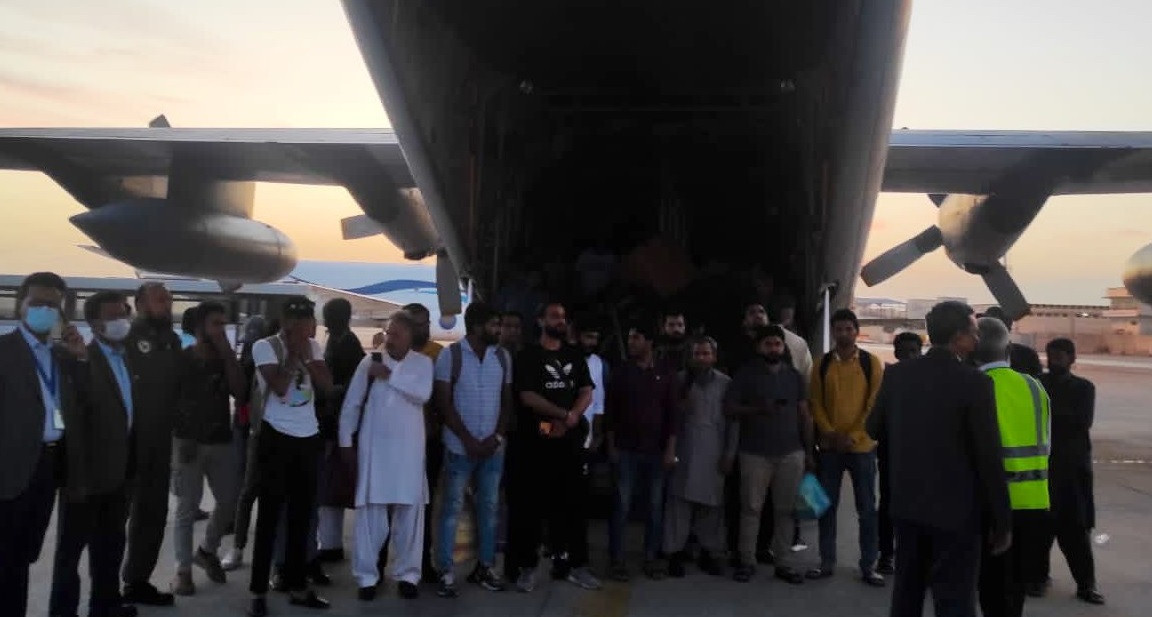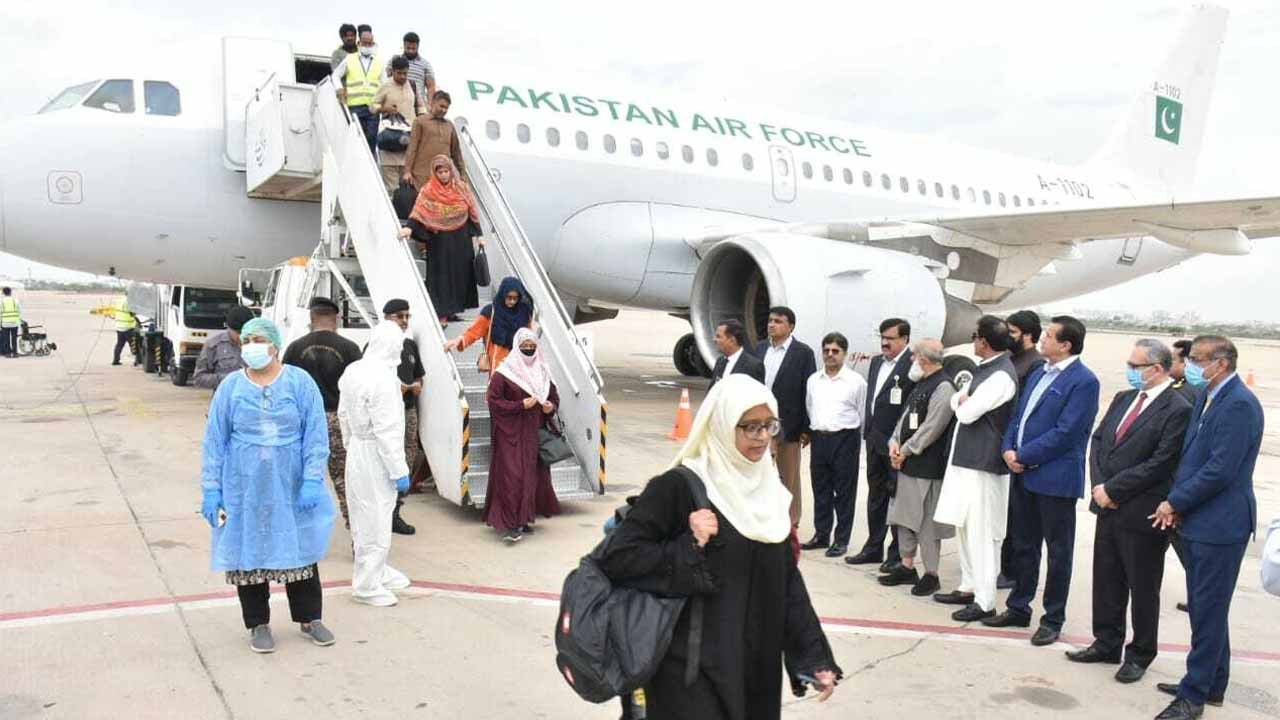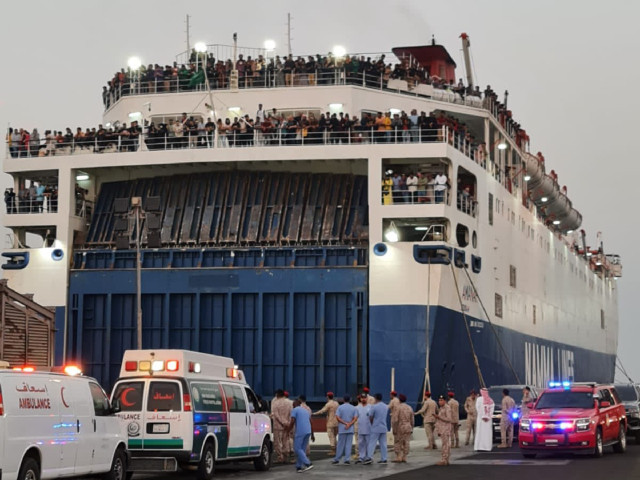It was a regular morning on the ides of April with birds chirping in the backdrop of the sound of cars moving across the street, as wives waved goodbye from their balconies to husbands leaving for work, and children going off to school. Little did anyone know that later that day, their lives were about to take a 360-degree turn.
If this sounds mysterious, slightly spine-chilling and a tad creepy like a horror film or a psychological thriller is about to begin, it does so for good reason, because when homes turn into a war zone in the snap of a finger and you have to abandon home and run, it is nothing short of a horrific nightmare, the kind they show in films.

Sami’s story
At 7.30 am, just when Ahsan Sami was getting ready to snooze a little after his sehri routine of offering prayers and reading the Quran, he suddenly heard a loud bang followed by the sound of continuous firing.
“I had never seen or heard anything like that since I moved here in 2017,” says Sami, a chemical engineer who until the war began, lived in Khartoum with his wife and two daughters, six and eight. “I started calling colleagues and friends, but no one had heard anything yet. Since everything seemed normal, I thought maybe this is just a conflict somewhere that would settle down.”
But the firing and explosion never stopped and within an hour, TV and internet unleashed the alarming news and chaos that a war had broken out between the Sudan Army and paramilitary Rapid Support Forces (RSF).
Initially for 30-40 minutes, no one had any idea what had hit Sudan, a peaceful land, the most hospitable country, and home to more than 1000 Pakistanis. “The firing was so loud as though it was happening in the other room,” Sami explains. “We tried to look out of windows to see what was happening, but we only saw big clouds of smoke all over indicating that several buildings were either destroyed or some huge infrastructure had been blown down by the RSF.”
After two hours of relentless firing and explosions, the army mobilised their troops and people could hear air missiles being shot, fighter jets flying over their houses, and even more firing. “Luckily, the internet was working and we were able to contact our friends and colleagues,” says Sami. “A WhatsApp group of the Pakistani community and the Pakistan Embassy in Khartoum was already in action so everyone started sharing the updates, videos and pictures from their surroundings which helped to understand the situation better.”
Like Sami and his family, scores of families went through the same ordeal and trauma. The embassy helped people who were in contact with the authorities and shared details. While some were willing to evacuate, others who had been living there since 10 years were reluctant to leave their homes in the hope that the situation would improve. In many areas, not just foreigners, but the Sudanese were also locking up their homes and leaving for other cities of Sudan.
“At first we were confused, but on May 20 when we were told that there is an evacuation plan in place, we decided to leave like almost everyone in our neighbourhood,” says Sami, whose family had packed a set of clothes, water, and food as instructed by the embassy. “We were not to exceed 10 kg of luggage, so we just kept essentials. Luckily, my residence was at a five-minute drive from Pakistan House so I dropped my daughters and wife there, and came back to park my car in a safe place. I walked back to Pakistan House from where a convoy of buses would leave for Port Sudan.”
The evacuees were not informed about the exit route in detail for safety purposes and also to avoid creating panic among an already disturbed community. They knew that they would be taken to the port of Sudan via land from where they would proceed to Jeddah via sea.
“It may sound simple and smooth, but the route to Port Sudan was 24-hour long with many RSF check posts, and crossing the borders of Khartoum took a while too and on the way we only saw deserted streets where until a week ago, there was a normal traffic flow,” says Sami whose family was among the first six-bus convoy to Port Sudan. “I have never felt or seen such fear and terror ever before.”
They thought that the ships would be ready for evacuees to leave as soon as they reached the port, but it wasn’t so because they were going to Pakistan through Saudi Arabia, not directly. “It was a 12-hour sea journey, but we had to wait another 12 hours to let the ship anchor at the dock,” says Sami who was in the first batch of evacuees that left Port Sudan for Jeddah. “After reaching Jeddah, we got the flight to Pakistan on the very first day and reached Karachi after the most terrifying experience of our lives. Being born and raised in Karachi, I thought I was used to firing, curfews, and conflict, but what I experienced in Khartoum was something we only see in movies.”
Sami has started looking for work in Karachi as there is no clarity as to when the uncertainty will end if the war situation improves. “Ideally, we would like to go back as we have a small house in Khartoum,” he says. “It was difficult to leave what was our home for the last six years. We had recently decorated our daughters’ room, and have all the essentials in our house. Just forgetting it is not easy.”

Rana’s story
Sami might have gotten out of Khartoum relatively easily, but some evacuees went through worse. Forty-year-old Usman Rana whose wife waved goodbye from the balcony of their house as he left for work in the morning, stood waiting anxiously for him in the same balcony, when he returned home safe, a few hours later.
Nine years ago, Rana arrived in Khartoum as a marketing and sales manager. While his wife and mother live with him, just last year, both his daughters moved to Malaysia for further studies.
“It was a normal day at work until 9.30 am when we started getting calls from our company truck drivers that the roads are closed because of heavy firing,” he says, recalling April 15. “First we couldn’t comprehend the situation, but within a half hour we could hear loud gunshots and missiles, as though our own factory was under attack. They decided to close the factory and the employees were allowed to go home, but one employee returned saying that the situation outside was dangerous.”
Since most of the workers were Pakistani and related to each other, it was decided that they would leave their cars behind, use motorbikes to commute fast through narrow streets and move to a nearby building of a relative. Leaving their belongings in the factory, they just took some cash and their phones as a law and order situation was also being reported.

“Around 30-40 men hopped onto bikes and took deserted routes,” recalls Rana who led the workers as he knew the area well and did his best to avoid encounter with the forces. “We tried to avoid main roads as much as we could because we could see huge clouds of smoke rising from there.”
He reached home to see his stressed out wife on the balcony, because she hadn’t been able to get through to Rana as he had switched off and hidden his phone. “I had even forgotten my home keys at work as I left in a panic,” he says.
Following his return home, they couldn’t leave their house for a week and had limited rations.
When the embassy informed them that evacuation had been arranged, Rana’s wife was hesitant to leave as they don’t have a house in Pakistan, and would have to stay with their extended family.
“I told her that it was not a time for being emotional and feeling attached to what they had built there in the last nine years, because life and safety mattered at that point,” says Rana. “We were in the northern part of Khartoum and it was almost an hour’s drive to Pakistan House from where the convoy of buses were to leave, but first we had to reach Pakistan House by ourselves. We were about 7-8 families and moving all of us wasn’t easy. Fortunately, two of our Sudanese logistics truck drivers offered to help and transported all of us to Pakistan House.”
According to Rana, the 45-minute route to Pakistan House was dreadful. “The arrangement of trucks took some time and then piling everyone into them further delayed us,” he says. “Since the internet was down, we had no way of contacting anyone so even while we were on our way, we feared that the buses might have left for the port without us.”
When they reached the buses had just started to move away, so they stopped them. Since there were not enough seats available, the women sat with kids in their laps on the few vacant seats, while the men sat on the floor for the entire 24-hour journey to Port Sudan. “We were stopped three or four times on our way,” says Rana. “The area was RSF controlled and dangerous, and despite a truce and ceasefire to let the civilians leave safely, we could hear firing and bombs explosions. It was nothing short of a nightmare and until dawn we couldn’t sleep or close our eyes even for a second.”
Port Sudan, according to Rana looked like a horrific scene out of a film with evacuees huddled everywhere among luggage, waiting for their turn to be called and to leave Sudan. “Saudi Arabia had set up a counter to collect passports and grant permission to leave after slapping passports with exit stamps,” recounts Rana. “It took a while for the first batch to leave and once they messaged that they were safe, everyone was relieved that the journey may have been tiring, but at least we were alive and safe.”
Rana has left behind in Khartoum a fully functional house, a good job and thousands of memories with his daughters who may never return to what they once called their home.
“They were planning to visit in the summer holidays, but I am not sure if they can do that now,” he says with a sigh. “The infrastructure, the economy, and almost everything has vanished. I might go back if things improve or maybe just to wrap things up and then find something here.”
Deeply grateful
A crisis is a moment when a nation’s image and desired public perception are highlighted for everyone to see. The Pakistani authorities efficiently and graciously rose to the occasion to help the stranded Pakistanis in Sudan, who were grateful for the efforts of the Pakistani embassy in Sudan and the Ministry of Foreign Affairs in Pakistan. They were not charged a single rupee for the entire trip from Port Sudan to Jeddah, nor for the flights from Jeddah to different parts of Pakistan.
The embassy had promptly contacted the Pakistani government for assistance and started collecting data as soon as the situation deteriorated in Sudan. The operation was conducted with the collaboration of four stakeholders, the Pakistan Embassy in Sudan, the Pakistan Consulate in Jeddah, the Ministry of Foreign Affairs, and Pakistan Air Force.
“In just three days, we sent the first convoy of 450 people out of Khartoum on April 23, 211 on April 24 and 183 on April 25 in 16 buses,” says a Pakistan Embassy official in Khartoum, on the basis of anonymity. He also pointed out that the main fear was RSF’s physical presence as they are young boys who are being brainwashed and it could have been problematic during evacuation. According to him, the situation was so bad that buses that would normally cost 1000-1500 dollars from Khartoum to Port Sudan, cost 25,000-30,000 dollars in crises.
Understandably so, but at least the buses provided a way out of hell with charred tanks, gutted buildings and shops that have been looted and torched, hundreds killed and millions still trapped in their homes running short on food and water.

Foreign Office role
Speaking to The Express Tribune, a spokesperson for Pakistan’s foreign ministry shared details about how the evacuation of Pakistanis stranded in Sudan was handled as the North African nation plunged into conflict.
“Following the outbreak of hostilities in Sudan, the Prime Minister, on the advice of Foreign Minister, directed the Ministry of Foreign Affairs to evacuate Pakistan community and Embassy Personnel from conflict zone in and around Khartoum to safe area in Sudan and eventually to Pakistan,” the spokesperson said. “During the crisis that coincided with Eidul Fitr holidays, Foreign Secretary chaired daily meetings of national stakeholders including OPHRD/OPF, PAF, and Missions abroad to monitor the situation and direct efforts for assistance and evacuation of Pakistani nationals in Sudan.”
The official added that at the outset of consistent, shelling and aerial firing, the Mission established a hotline for registering Pakistanis willing to be evacuated from Sudan. “The Mission made strenuous efforts to map the location of all the Pakistanis and established contact with them for evacuation. Pakistan community was also advised to stay indoors in view of consistent shelling in the city.”
According to the spokesperson, initially out of the reported 1000, only 360 individuals, mostly accompanied by families, registered with the Embassy for evacuation. “As the fighting intensified and spread around Khartoum, around 700 more Pakistanis approached the Embassy for evacuation. They were also transported to Port Sudan.”
Since the crisis began, over 1,000 Pakistanis have been safely evacuated from Sudan to Jeddah from where they are being flown to Pakistan. “With generous support of the Government of the Kingdom of Saudi Arabia, more than 530 Pakistanis were evacuated to Jeddah via Saudi naval ships and few by air. The Saudi Government also graciously hosted the stranded Pakistani nationals in Jeddah pending their repatriation to Pakistan by air by special PAF flights as well as commercial flights,” the official shared. The last batch of 171 nationals aboard Saudi ship that departed from Port Sudan was scheduled to reach Jeddah Thursday night and flown to Karachi aboard the seventh special flight operated by PAF the following day.
According to the spokesperson, the Kingdom of Saudi Arabia issued urgent visas to the evacuees and processed flight clearances of aircrafts flying the evacuees from Port Sudan to Jeddah and back to Karachi on short notice.
Asked if there was any truce or agreement not to harm Pakistanis on their way to Port Sudan from Khartoum when the evacuation was planned, the spokesperson said, “On the persuasion of the international community, the combatants announced a ceasefire for 72 on the occasion of Eidul Fitr to facilitate exit of foreign citizens and diplomats.”
“Therefore, a decision was taken by the Government of Pakistan to evacuate Pakistani community during the ceasefire. Though there were light skirmishes during the ceasefire, lot of foreign convoys were able to evacuate from Khartoum to Port Sudan unscathed.”
On the topic of Pakistani evacuees praising the government for not charging them a single rupee during repatriation, the official said: “The Pakistani community overseas is an asset for the Government of Pakistan. Ensuring their well-being and safety is an important mandate of Ministry of Foreign Affairs and its missions abroad. We acknowledge the patience, courage and spirit of camaraderie displayed by the Pakistan community and their trust in following the guidelines of the mission throughout the evacuation process.”
“Reportedly, Pakistanis in small numbers, who had initially opted to stay back in Sudan are still contacting the Embassy of Pakistan in Khartoum, now operating in Port Sudan at full strength, to help with their safe return to Pakistan,” the spokesperson said, adding that the Embassy will continue to operate from its temporary camp office in Port Sudan and assist the Pakistan community with any potential issues that may arise. The official encouraged Pakistani nationals all over the world to keep their identity/travel documents updated to avoid inconvenience in unforeseen situations such as the Sudan crisis. “Nationals married to foreign nationals are also encouraged to process the Pakistan Origin Card in respect of thereof spouses and children.”
